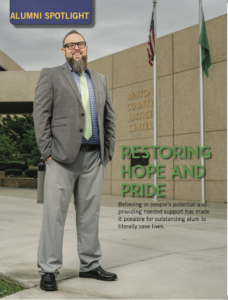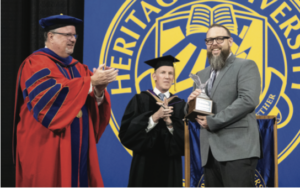Restoring hope and pride – WINGS Summer 2023

Heritage University Alumnus of the Year Ryan Washburn has spent his entire work life helping people rebuild their lives.
As a veteran service representative at Columbia Basin College, he helped veterans navigate college life. As program director at Elijah Family Homes, he helped low-income families in recovery become self-sufficient through stable housing and supportive services. In his current role as Therapeutic Court Coordinator in Benton County’s District Court, his work ensures that people struggling with mental illness and addiction get help to lead healthier lives.
But what means the most to Washburn isn’t the job titles that populate his resume. It’s the individual people he’s helped.
They’re people like “Charlie,” a veteran of the first Gulf War who returned home wondering where he belonged. He used drugs, became addicted, was arrested multiple times, and spent years in and out of what Washburn calls the “revolving door of the justice system.”
Entering Veterans Court following his release and having been ordered to check into “clean and sober housing,” Charlie absconded. He was promptly kicked out of the program that was designed to help him.
When he appeared in court, Charlie asked to read a letter he’d written. Through his tears, he said he’d promised his mom if he were given another chance, he wouldn’t disappoint her again. The judge let him remain in the program under the stipulation that his every move would be under Washburn’s vigilant watch.
“Today, Charlie is working on his bachelor’s degree in addiction studies with a plan to become a substance abuse professional,” Washburn says. “And he’s back with us, mentoring others.”
It was only after Charlie completed treatment that Washburn learned the extent of what he dealt with every day.
“He’d been in the 1996 Khobar Towers bombing in Kuwait,” Washburn says. “He pulled his dead friends from the rubble. He was 19 or 20 years old.
“He suffered textbook Post-Traumatic Stress Disorder (PTSD) – and we hadn’t even known about it.
“I learn every day that not all wounds are visible. And what people also don’t see is that there are a ton of people who work hard and, with support, they change their lives.
“I get to help them do that.”
NAVIGATING HELP
Washburn knows what it’s like to struggle. After serving eight years in the United States Navy in three consecutive Arabian Gulf deployments, he had trouble finding a sense of direction. He ultimately enrolled at Columbia Basin College (CBC) and got a work-study job helping veterans transition to college. There he put his love for his fellow vets to work, regularly going above and beyond his job description.
“I wouldn’t just tell them what office to go to; I’d take them there and introduce them,” he says. “I know what it’s like to feel like you don’t fit in.”
As that proclivity for connecting with other vets was recognized, Washburn was approached about becoming a “veteran navigator” for the Washington Department of Veteran Affairs (WDVA). There, he instituted regular trainings for faculty and staff on how to better serve veterans.
After earning an associate’s degree from CBC, Washburn enrolled at Heritage. He majored in education until two of his instructors, who had noticed his easy-going relationships with other vets, suggested he consider social work. He changed his major to interdisciplinary studies and graduated with his bachelor’s degree in 2012. He then pursued a master’s degree in clinical social work at Walla Walla University.
“Through the observant eyes of my professors, I was guided to the path of social work where I was able to lead a life of service to others,” says Washburn. “I strive to embody the values of Heritage in my everyday life as I lead others in their service to others.”
UNDERSTANDING OTHERS
At Walla Walla, Washburn did an internship with Elijah Family Homes, a nonprofit providing stable housing and supportive services to families in recovery. He remembers going into that internthip with the mindset, “if you want to quit drugs, you just quit.” He said that his thinking shifted on his very first day on the job.
“My field supervisor took me to meet a client who asked me if I was an addict. When I told her no, she said, ‘You have to understand how we think and feel and act.’ So she took me to a Narcotics Anonymous meeting. I learned very quickly that addiction is a disease.
“It was a profound ‘aha’ moment of my life that, wow, these people have real struggles.”
Ultimately, Washburn was asked to be Elijah’s program director and felt such a sense of purpose there that he thought he’d never leave. But when he was offered a position in the Benton County Veterans Court that would give him the authority to make a more significant difference in people’s lives, Washburn accepted. He was hired as its first case manager and would be integral in starting its Substance Abuse Court.
Washburn’s exemplary work got him promoted to run the entire Therapeutic Court program, which also oversaw Mental Health Court. He expanded existing programs and added a Recovery Court.
“In these courts, you’re stipulating that for 12 to 24 months, you will follow all conditions – showing up in court, drug testing, counseling, staying out of trouble, staying employed or looking for employment, or going to school.
“It’s judicial accountability and treatment rolled into one. We’re all up in their business all the time, but we slowly pull back the support. The person gets into a life of sustainable recovery, a productive life, and, ultimately, it reduces recidivism while making the community safer and saving taxpayer dollars.”
LOVE FOR COMMUNITY
“The only thing Ryan loves more than his community is his family,” wrote Eric Andrews, Washburn’s former colleague, in his Outstanding Alumni nomination. Washburn is a devoted husband and father of three boys; with a job that can be stressful, he says he finds deep peace and enjoyment in family time.
“My work is challenging, but it makes a difference. We restore hope and pride, reuniting families. We’re affecting real change and saving lives.
“I don’t know how many people have said, ‘If it wasn’t for this program, I’d have been dead by now.’
“I have goosebumps when I talk about what we’re able to do. It just makes my heart really happy.”
